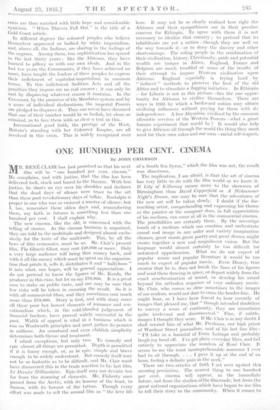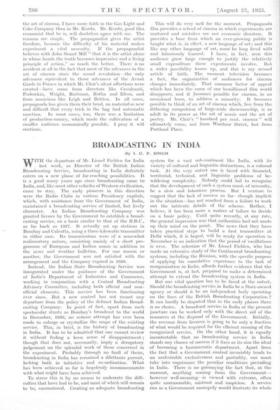ONE HUNDRED PER CENT. CINEMA
By JOHN GRIERSON MR. RENE CLAIR has just promised us that his next film will be " one hundred per cent. cinema." Ile complains, and with justice, that the film has been delivered lock, stock and barrel to the theatre. With less justice, he slants an eye over his shoulder and declares that the dead days • of silence were truer to the art than these post-revolutionary days of talkie. Nostalgia is proper in one who was so eminent a master of silence, but 1, too, remember these olden days and, remembering them, my faith in futures is something less than one hundred per cent. I shall explain why. The new cinema, like the old, is concerned with the telling of stories, As • the cinema business is organized, they are told to the multitude and designed almost exclu- sively for the taste of the multitude. This, by all the laws of film economics, must be so. Mr. Clair's present film, The Glourie Ghost, may cost £40,000 or more. Only a very large audience will bring that money back, and with it all the money which must be spent on the organiza- tion that prints it, sells it, distributes it and " ballyhoos " it into what, one hopes, will be general appreciation. I do not pretend to know the figures of Mr. Korda., the producer in this case, but let us say £70,000. It is a great stun to stake on public taste, and one may be sure that few risks will be taken in ensuring the result. So it is with all commercial films, and they .sometimes cost much more than £70,000. Story is first, and with story come all these poor but honest elements of romance and sen- tionalism which, in the cold-blooded judgement of financial backers, have proved widely successful in the past. Width of appeal is vital in a business which is run on Woolworth principles and must gather its pennies in millions. An unnatural and even childish simplicity determines both theme and treatment.
I admit exceptions, but only two. To comedy and epic almost all things arc permitted. Depth is permitted if it is funny enough, or, as in epic, simple and brave enough to be widely understood. But comedy itself may not be so fantastic As to be difficult, and Mr. Clair must have discovered this in the trade reaction to his last film, Le Bernier Milliardaire. Epic itself may not deviate too far from the storming of elements. Mr. Flaherty once passed from the Arctic, with its honour of the hunt, to Samoa, with its honour of the tattoo. Though every effort was made to sell the second film as " the love life of a South Sea Syren," which the film was not, the result was disastrous.
The implication, I am afraid, is that the art of cinema has very little to do with the film world as we know. it. If Lily of Killarney means more to the showmen of Birmingham than David Copperfield or A Midsummer Night's Dream, one may be sure that the adventures of the new art will be taken slowly. I doubt if the far- reaching artist, comprehending and expressing his theme as the painter or the composer does, in full appreciation of his medium, can come at all in the commercial cinema. The possibilities are certainly there. By the sovereign touch of a medium which can combine and orchestrate sound and image in any order and variety imagination chooses, great music, great poetry and great drama might create together a new and magnificent vision. But the language would almost certainly be too difficult for untutored apprehension. What we do not expect of popular music and popular literature it would be too much to expect of popular movie. Even Disney, true creator that he is, does not break the lines of his figures and send them dancing in space, or depart widely from the exact synchronization of sound, or develop his sound beyond the orthodox sequence of very ordinary music. Mr. Clair, who comes so close sometimes to the images of stir-realism, would not dare to cross the border-line.. He might hear, as I have been forced to hear recently of images that pleased me, that " though intended doubtless to convey a sense of continuity, they are sometimes quite irrelevant and disconnected." Fine, if subtle, images I thought they were. If Mr. Clair is in any doubt I shall remind him of what Mr. Fredman, our high priest of Wardour Street journalism, said of his last fine film ; " I'll take in a basinful of Ernie Lotinga and probably laugh my head off. I've got plain everyday likes, and fail entirely to appreciate the wonders of Rene Clair. It seems to me the most incomprehensible nonsense I ever had to sit through. . . . I gave it up at the end of an hour, feeling a definite pain in the neck."
There are two articles of faith I set over against this seeming pessimism. The nearest thing to one hundred per cent. cinema will appear, in the immediate future, not from the studios of the film trade, but from the great national organizations which have begun to use film to tell their story to the community. When it comes to the art of cinema, I have more faith in the Gas Light and Coke Company than in Mr. Korda. Mr; Korda, good film economist that he is, will doubtless agree with me. The reasons arc simple. The propagandist gives the artist freedom, because the difficulty of his material makes experiment a vital necessity. If the propagandist believes with John Stuart Mill " that it is the artist alone in whose hands the truth becomes impressive and a living principle of action," so much the better. There is no accident at all in the fact that most of the advances in the art of cinema since the sound revolution—the only advances equivalent to those advances of the Avant Garde in France in. which Mr. Clair's silent affections were created—have come from directors like Cavalcanti, Pudowkin, Wright, Mittman, Rotha and Elton, . and from musicians like Leigh and Britten. In all cases, propaganda has given them their head, on material so new and difficult that every trick in the bag had automatic sanction. In most cases, too, there was a limitation of production-money, which made -the cultivation of a smaller audience economically possible. I pray it will continue. This will do very well for the moment. Propaganda film provides a school of cinema in which experiments are nurtured and mistakes are not economic disasters. It provides a base from which an ever-growing public is taught what is, in effect, a new language of art ; and this like any other language of art, must be long lived with and laboriously learned. I have, in fact, seen this audience grow large enough to justify the relatively small expenditure these experiments involve. But a wider possibility looms up, and this is my second article of faith. The moment television becomes a fact, the organization of audiences for cinema changes immediately. That common factor of appeal which has been. the curse of our bemillioned film world disappears, and it ,becomes possible for cinema, in an occasional hour, to address a minority. It becomes possible to think of an art of cinema which, free from the dithering compulsion of large-scale showmanship, is as adult in its power as the art of music and the art of poetry. Mr. Clair's " hundred per cent. cinema " will ultimately come, not from Wardour Street, but from Portland Place.



































 Previous page
Previous page